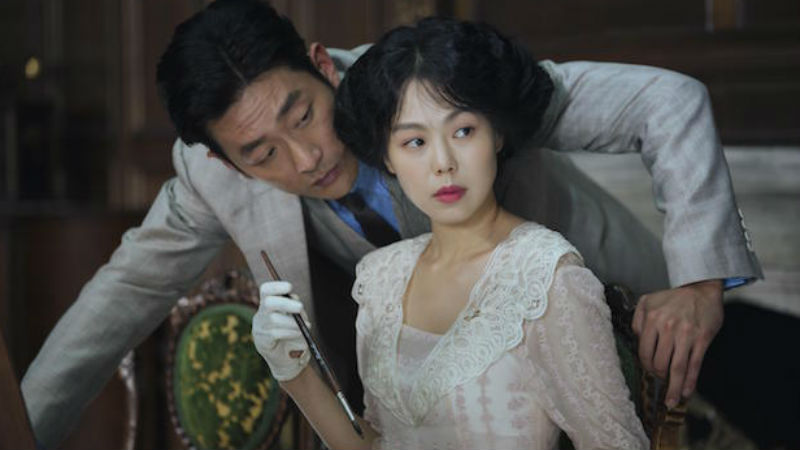




The grudge and the rivalry between the Japanese and the Korean is no novelty, but what about transposing this inimicality into an unlikely lesbian romance with a British twang? This very ambitious endeavour is inspired on Fingersmith, a 2002 historical crime novel set in Victorian Era Britain by and written by Sarah Waters, moved to Korea in the 1930s, the period of Japanese occupation. And a big chunk of the action takes place inside a countryhouse blending British and Japanese architecture. The Handmaiden is a rich mélange of cultural references.
The very young, petite and charming Sookee (Kim Tae-ri) is hired as a handmaiden to the taller, older and equally attractive Japanese heiress Hideko (Kim Min-hee). She lives in a large, secluded and impressive mansion in the countryside. In reality, Sookee was recruited by a criminal posing as a Japanese Count in order to help him to seduce the rich lady, seize her wealth and lock her up in a mental asylum. But soon the two women are sexually drawn to each other, and the plans takes an unexpected turn. Many more twists will follow, in a very long and epic story divided in three parts.
The cinematography of the film is certain to leave you breathless: the costumes are plush, the residences are luxurious, the outside is bright and verdant. The film aesthetics are somewhere between Amélie (Jean-Pierre Jeunet, 2001) and Realm of the Senses (Nagisa Oshima, 1976). In other words, it’s a combination carnal pleasures and colourful fantasy. It’s a 100% technically accomplished movie, but it fails in some other aspects.

The sex scenes partly are partly convincing. While there is definitely sexual tension between the two beautiful actresses, and some moments are highly erotic – including a 69, scissor sisters action and very bizarre finger-in-the-mouth moment – the gaze remains extremely masculine. Park Chan-wook may have wanted to celebrate lesbian romance, particularly as he found inspiration in a book authored by a woman, but the final outcome comes across as a piece of male voyeurism. I doubt that lesbians will relate to all the wiggling and giggling of the two protagonists.
Another problem with the film is the gratuitous violence in the end, which comes across as a very perverse substitute for the previous carnal pleasures. And the convoluted film narrative has some redundant elements. The repetition of some sequences, while placed in an entirely new context, sometimes feels a little long and unnecessary.
The Handmaiden is showing in the BFI Flare London LGBT Film Festival taking place this week – click here for more information about the event. The film is out in cinemas in April.
















